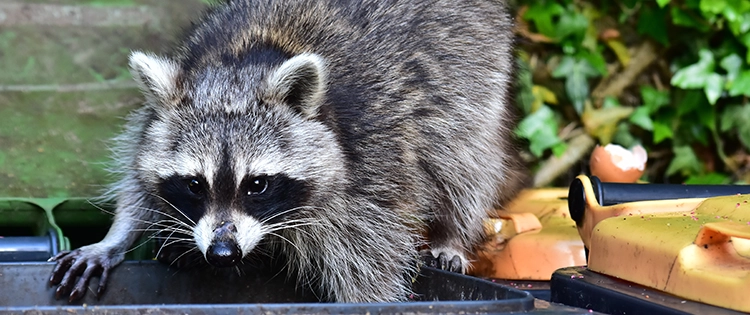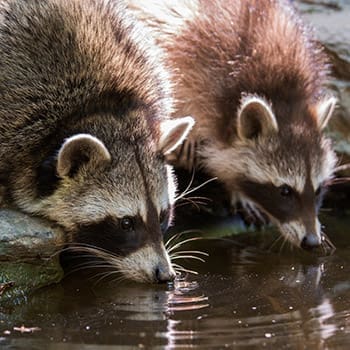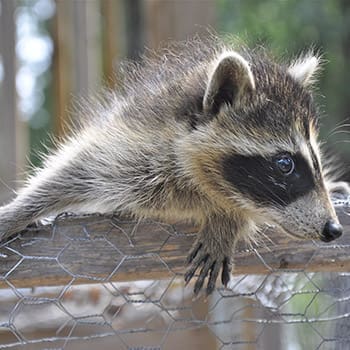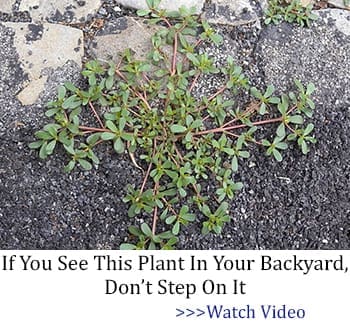Perhaps you’ve come out to the horrifying sight of raccoons on your property after they’ve invaded your chicken coop overnight. Everyone who’s experienced this is well aware of what I’m talking about (and we aren’t going to get more graphic than that for the people who are a little more soft-hearted). It’s a nightmare, a tragedy, and it doesn’t have to happen.
How do you keep raccoons away from your property? Let’s find out.
Secure Your Trash Cans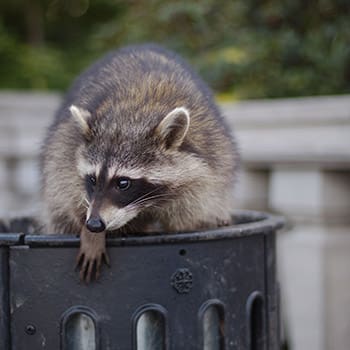
The primary reason you have raccoons invading your property is to dig around in your trash. No, they aren’t looking for the latest or hottest tea that you have hidden away, they’re looking for an easy meal. And you, accidentally or on purpose, are giving it to them.
Our suggestion? Lock your trash cans up or keep them very, very far at the end of your property (if you’re rural). A quick bungee cord over the top of a loose lid is usually enough to stop them; until they figure out that they can gnaw through it, anyhow.
Outdoor Feeders
Oh, the poor kitties in the neighborhood look so hungry and thin. You’re just doing a nice thing by feeding all the strays, right?
That fat raccoon who waddles up to the feeder and mauls the neighborhood stray cats thank you, too.
Keep in mind that these are incredibly opportunistic feeders. They will happily eat absolutely anything that they can get their mitts on and cat food (or dog food) is an easy win for them. It isn’t very good for them nutritionally, but they love it.
The best way to prevent this is to trap the local strays and adopt them to good homes. This way you no longer have to worry about them getting fed and cared for, and your local raccoons won’t gorge themselves on Special Kitty.
Get Rid of Grubs
Grubs are the number one problem that attracts raccoons (mice are the second one). I strongly recommend eliminating grubs from your property, at least near your animal pens and home, to keep raccoons from roaming too close for comfort.
There are a number of both humane and immediate elimination products out on the market and I hesitate to recommend any of them over the others. Honestly, I would check with your local hardware store and see what works best on the grubs in your area and for your personal situation. If pets or other animals will be in the area, make sure that any product you end up using is appropriate for them, too.
Protect Water Sources
If you have a lake near your home, this one may not be a lot of use for you. Frontyard lakes or extremely large bodies of water are nearly impossible to create barriers around for the local wildlife. I’m sure you’re already aware of this.
However, if your problem is that you have a small decorative pond that raccoons won’t stop drinking from (and also probably fishing in, honestly), there are dozens of ways to prevent that. My favorite method is pretty cheap, though you’ll need to be careful with how you work with it.
A hot wire (or two) strung around your pond will stop any predators, including raccoons, from using it as a water source. Will it hurt them? Temporarily. Get a fence charger that is .2 joules or lower and you won’t kill them, it just stings and makes the limb they touched the fence with go numb for a little bit. Will they make a lot of noise about it?
Almost certainly.
This will prevent them from climbing in, on, or around your pond, and that is our ultimate goal. I also strongly recommend putting the fence charger in a 5-gallon bucket (with sufficient drainage) to prevent them from being able to dislodge or chew on the charging box itself. Though they may nibble on the wires leading out of the bucket, few raccoons will explore this thing that they don’t understand that far. Most will just get a brief, uncomfortable zap and, after a couple of times, decide that they’ll try to find water elsewhere in the future.
Predator-Proof Your Poultry
Raccoons love chicken almost as much as we do. Their second favorite? Duck. I have seen raccoons nearly kill themselves trying to get their paws on a female duck while a drake was tearing them up for it. I intervened, everybody survived, and we all went on to talk about raccoons another day.
I’ll just be blunt: chicken wire or “poultry mesh” is a joke. It’s for quick patches or making crates for auctions or sales. It will restrain poultry, but it won’t save their lives in a predator situation. Chain link is a good start, but raccoons can reach right through it and tear a chicken (or a rabbit) to pieces while the animal has no idea what to do except sit there and be slowly devoured.
I recommend getting 1/4″ hardware cloth mesh. If you can’t find it, get 1/2″. 1″ will still allow young raccoons and even opossums to reach through and snag your animals. The smaller mesh will not. Put it on with solid metal ties or deep-impact wood staples, which go so far into the framework that your raccoon problem will no longer be one.
Additionally, bird flight mesh at the top of your enclosures is not going to keep anything out, either. You need to place a mesh or a solid roof up there; one with no gaps to allow any predators in. Because if there is a gap, they will find it. And they will go after your entire flock once they’re inside, leaving nothing but feathers and bodies in their wake.
What have you done in the past to eliminate a raccoon problem, other than having raccoon stew for dinner? Did we miss a key detail that you think needs to be put out there? We’d love to hear about it in the comments below. See you again soon!
Most Vicious Chicken Predators
Do You Know Why You Should Never Put A Tall Fence Around Your House? (Video)
Worst States To Live In If You Have To Defend Your Property
25 Basic Life Skills That Should Be Taught in School (But Aren’t)
